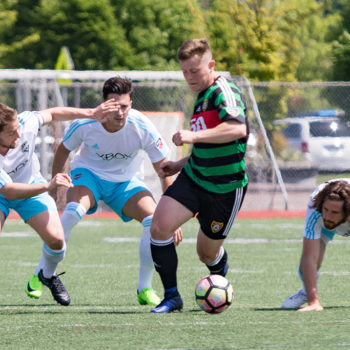
How Much of the Pro Soccer Game is Mental?
Defining the Mental Game of the Emerging Pro Soccer Player

By Derrek Falor, M.Ed., CMPC
With the MLS pre-season getting underway this week, I thought it would be timely to talk about the mental side of pro soccer. Generally, soccer culture relies on four pillars of the game when considering training and team formation (Technical, Tactical, Physical, Psychological). In theory, those pillars work in concert to form a balanced wheel of player development. Provided the physical, technical, and tactical skills are in place, the mental profile then becomes the determinant for success. In the professional levels measuring the technical, tactical and fitness pillars is commonplace. However, measuring and creating data analysis for the fourth pillar, the mental/psychological pillar, has been lacking to date. As a certified sport psychology consultant working with professional soccer players, my clients and I both know the mental part of soccer is significant. However, just believing that a large part of high level soccer is mental doesn’t provide enough direction to help a player perform consistently at his most effective level when he takes the field. I believe the keys to effective mental training for player development lie in the player determining how much of the game he believes to be mental, and secondly qualifying exactly which specific mental skills of his demonstrate a need for improvement.
Being successful in professional soccer requires an elite level of technical skill, tactical acumen, and physical ability. To be effective young pro players need to improve their physical fitness, technical, and tactical ability, but they also need to develop strong mental skills. These strong mental skills allow them to play with purpose and accountability, to be effective under duress, function as part of a unit, and win their 1 vs 1 battles in crucial moments. For the emerging soccer professional, it is vital to successfully execute the responsibilities of his position under time and space pressure or challenging situations, not just when things are easy. To succeed through this gauntlet, a quality mental training program would effectively augment the good work already being provided by pro clubs. Most often this cognitive development is left to chance since it has been difficult to measure and assess this pillar of the game.
Clubs collect vast statistical data regarding fitness, recovery, on-field choices, and lifestyle habits. Many college and pro clubs routinely use GPS systems to record workload, speed, and acceleration of players during training and games to more effectively plan training session. Strength and conditioning coaches frequently incorporate heart rate monitored cardio sessions for players to improve their base line fitness. This information produces helpful scientific data points for coaches to maximize their team’s potential results.

On the pro levels measuring components of the technical, tactical and fitness pillars is commonplace, even to the point of hiring sport science data analysts. Up until now however, measuring and defining mental skills in soccer has been missing. Believing elite mental skills are essential is not the same a providing clear practice and application of those critical skills. Using the data results from this group study will assist in implementing a mental skills training program made up of the following components:
- Assessing player understanding of mental skills on his game
- Analyzing player competency through game relevant mental skills
- Training players to maximize their unique abilities in challenging situations
- Implementing daily mental skills practice into training and practice plans
As an open skills sport, soccer presents numerous opportunities where quality decision making, distraction control, or a simple mistake can turn the game in a heartbeat. Will a player make the needed adjustments and execute well, or will he dwell on a previous mistake perhaps setting himself up for another? Does the young pro player take the field understanding the variables he can control and set out to dictate the play around him based on those controllable variables? Or is he undone by internal or external distractions causing him to lose concentration or confidence in crucial moments? Creating a lengthy career requires significant mental skill ability. The documentable technical differentiation between being an MLS player and any other pro tier is excruciatingly small. Mental skills are one differentiator that is measurable and highly indicative of a player’s potential effectiveness and longevity in the pro ranks.
This study on mental skills in the emerging pro player consists of 30 players in their first 5 years of league play: 11 MLS, 19 combined from USL, NASL—including full and youth national team players, former NCAA All-Americans, foreign players, players from big schools, mid major schools, NCAA D3 institutions, and Junior colleges. Participants are a mixture of starters and bench players spread across all positions and all regions of the country. Some players in this group study have played on teams that have won an MLS cup in the last two years, some have never seen the play-offs at the pro level. Finally, the average age of the players in this study is 23 years old across all levels of play. The goal for this case study is to answer four key questions pertaining to the mental skills of the emerging pro soccer player:
- How much of the game do young pro players believe to be mental?
- Is there a definable mental skills profile of the emerging pro player?
- Are there differences in mental skills abilities across positional groups?
- Is there a difference in the mental skills abilities across the various levels of play?
Question 1: How much of the game do pro players believe to be mental?
The short answer is a lot! When asked their thoughts about how much of the pro game happens between the ears the players in this study, answered on average 69% of the game at their various levels, is mental. In fact, this quote from a client who is a Canadian U23 International, and USL midfielder, effectively sums up the importance of the mental game;
“I would say it’s maybe the most important piece at the pro level. Everyone can do the basics but who has the mental strength, capacity and flexibility to play at this level is key.”
Similar thoughts are echoed by a keeper playing on an East Coast USL team, lending support to how much of his game is mental:
“The biggest part of my position is the mental aspect, just knowing that goals are going to happen and that I’m not going to be able to save everything. If a mistake is made I have to put it into my pocket, zip it up, and not let it out until after the training or game, where it can be better analyzed and doesn’t affect my performance.”
Succinctly stated from yet another pro in his first year of play for an NASL organization on clarifying the value of being mentally strong,
“I believe that the pro game is 90% mental for sure. No matter the ability or talent, if your head is not right, it doesn’t matter.”
And yet one more thought from a MLS goalkeeper in his second year of play:
“I believe that 80% of the game is mental for a goalkeeper. While the physical aspect of soccer is incredibly important as well, the concentration and focus required to play goalkeeper is vital. One little lapse and a goalkeeper can go from hero to zero, which at this point is where his mental toughness is tested the most. Soccer is a very easy game to play when everything is going smoothly. However, when a mistake is made, your mental ability to forget, and recover for the next play or game, is critical to your success in soccer.”

These same pro players in this study were asked “what percentage of your soccer time do you spend on mental training?” The answers ranged between 0% and 10% of their soccer day is given to mental training. Such a small percentage of players earn the chance to become a pro, so if elite players feel a high percentage of their game is mental (69% according to this group), then why do they spend so little time (0% to 10%) training to improve the one area of their game that might truly help them consistently play at their best? Why wouldn’t they want to improve such a significant, portion of their game? Possibly because without data to show them exactly which mental skills most need improving, they don’t know where to start.
Stay tuned for Part 2 where we define the mental skills profile of the young pro player.
If you would like to read the article in its entirety, please check it out in The Soccer Journal:
Defining the Mental Game of the Emerging Pro Soccer Player
- Getting Your Intensity Level Right - March 17, 2025
- Building a Functional Resilience Plan is Vital to a Referee’s Success - February 18, 2025
- sport in a pandemic: Crisis or opportunity?Chapter 4 - December 4, 2020


